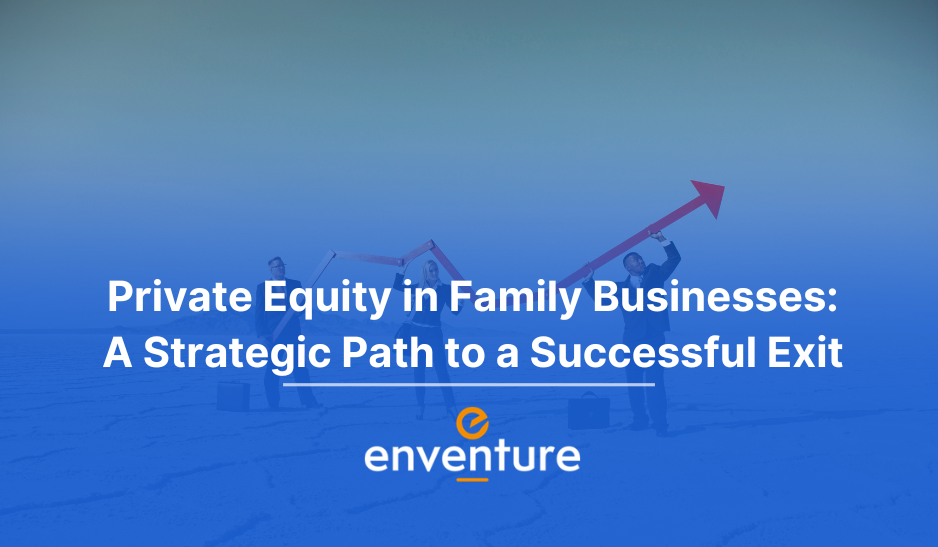Discover how private equity helps family businesses unlock value, ensure smooth succession, and achieve a successful and profitable exit strategy.

By Ankit Shrivastava, Managing Partner, Enventure
Family businesses are the backbone of many economies, often built with decades of dedication, values, and legacy. However, as founders age or the next generation opts for different pursuits, the challenge of succession planning and exit becomes imminent. In this context, private equity (PE) has emerged as a powerful tool—not just for growth, but also for crafting well-planned, value-driven exits for family business owners.
Why Exiting a Family Business Is Complicated
Exiting a family-owned enterprise is emotionally and operationally complex. Unlike corporate firms, family businesses are deeply personal—wrapped in identity, legacy, and often, lack of clear succession planning. Common challenges include:
- Reluctance to let go of control
- Lack of interest or readiness of the next generation
- Unclear valuation or liquidity options
- Weak governance or financial discipline
These issues can delay or derail an effective transition. This is where private equity can provide clarity, structure, and a compelling path forward.
How Private Equity Adds Value to Family Businesses
1. Liquidity Without Immediate Exit
Private equity firms can buy a partial stake, offering the family liquidity while keeping them involved in the business. This phased transition is less disruptive and provides time to align on future plans.
2. Professionalizing the Business
PE investors often bring in experienced leadership, implement robust systems, and instill corporate governance—all of which increase enterprise value. This professionalization makes the business more attractive to future buyers or public markets.
3. Accelerated Growth Before Exit
Private equity firms typically work on scaling the business through acquisitions, new market entry, or digital transformation. This short-term value creation (usually over 3–7 years) maximizes the final exit value—whether through a full sale, IPO, or strategic partnership.
4. Multiple Exit Options
Private equity firms are experts at preparing businesses for sale. With their networks and transaction experience, they can facilitate:
-
Strategic sales to competitors or conglomerates
-
Secondary buyouts (sale to another PE firm)
-
IPOs or listings
-
Management buyouts
5. Reduced Emotional Burden
PE brings a structured and objective perspective, easing the emotional difficulty of letting go. Family owners can exit confidently, knowing their business is in professional hands.
A Win-Win Scenario
Family business owners gain:
-
Liquidity and wealth realization
-
A structured succession plan
-
Preservation of legacy and employee welfare
Private equity firms gain:
-
Access to underutilized but resilient businesses
-
High ROI potential through operational improvements
-
Long-term partnerships with committed family members
Real-Life Example (Hypothetical)
Consider a second-generation family textile business in India with solid cash flows but stagnating growth. The founder wants to retire, but his children aren’t interested. A private equity firm acquires a 70% stake, retaining the founder as an advisor. Over five years, the firm brings in a new CEO, introduces automation, expands exports, and eventually sells the business to a global fashion conglomerate—tripling the enterprise value. The family secures generational wealth, and the business thrives globally.
Conclusion
Private equity is more than just capital—it’s a strategic partner for family businesses navigating complex transitions. For founders who want to secure their legacy, reward their efforts, and ensure the long-term success of the business, private equity offers a well-structured and high-value exit route.
In a world where change is inevitable, the right private equity partnership can turn the end of one chapter into the beginning of an even greater one—for both the family and the business.
About Author
Ankit Shrivastava is the Managing Partner at Enventure, where he leads investment and strategic advisory across the U.S. and India. His work bridges global innovation in healthcare, space, and sustainability through data-driven decision-making and long-term partnerships.
Bold Moves,
Brighter Futures
Let's team up and make a difference.
Subscribe to our newsletter
Enventure is an exit-driven fund with high-yield opportunities in the healthcare, space, and green tech sectors across the US and India.
Mail Us
3103 Kewanee Ln,
Naperville, IL, 60564
Copyright © 2025 Enventure, all rights reserved.
